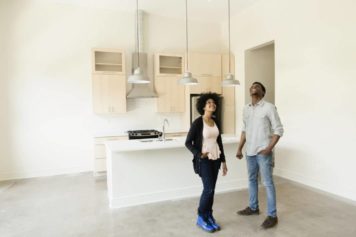
In 1970, the rate of Black homeownership in Seattle was well above the national average of 42 percent. (Image by Thomas Barwick /DigitalVision/Getty Images.)
For Black families living in Seattle, Wash., the dream of owning a home isn’t as feasible as it used to be. In fact, the region’s rate of Black homeowners now ranks among the lowest in the nation.
Today’s rate is a far cry from what it was in 1970, when U.S. census data indicated that nearly half of King County households headed by an African-American owned their home. At the time, the region boasted a Black homeownership rate of 49 percent — well above the national average of 42 percent.
Since then, however, homeownership among Seattle’s Black residents has been on a steady decline, with only 28 percent of Black-led households in King County owning their homes, The Seattle Times reported. That’s about 13,000 of the region’s nearly 48,000 total households.
While homeownership for Latinos also has suffered a dramatic decline since 1970, rates among the region’s white and Asian residents have remained relatively stable. African–Americans haven’t fared so well, though, as the housing market’s racial affordability gap has left even the most affordable homes out of reach for Seattle’s would-be homebuyers. Now, the city’s rate of Black homeowners sits far below that of the U.S. average.
Ron Sims, the former deputy secretary for the U.S. Department of Housing and Urban Development, attributed the sharp decline of Seattle’s Black homeowners to the recent tech boom, arguing that the sector has failed to provide the city’s Black residents with equal employment and financial opportunities.
For him, the post-war “Boeing Boom,” in which the aircraft company provided thousands of African-Americans with high-paying jobs following World War II, was much more beneficial.
“African-Americans haven’t done well in the economy of King County and the Puget Sound, as Boeing has moved jobs elsewhere,” Sims told The Seattle Times. “I’ll be blunt about it: The tech sector has failed to provide open doors and equal pay to African-Americans. And they’ve acknowledged it.”
The most recent census data showed that less than 2 percent of King County residents who work in the tech sector are Black. Compare this to the 1950s, when the median income for Black households in Seattle was only 1 percent lower than the national average for whites due to the area’s availability of well-paying jobs. However, the ever-rising housing prices in King County have shut many African-Americans out of the market.
The Seattle Times reported that among the nation’s 100 counties with the largest Black populations, King County now has the fifth-lowest rate of African-American homeowners. Manhattan, the Bronx and Hennepin County, Minn., have even lower rates of Black homeowners than the Seattle-area county. In NYC, however, homeownership is rare across the board, not just for African-Americans.
Sims argued that the inability to purchase a home has a much greater impact on Black folks, who are less likely than whites to invest their money and own any assets.
“For a lot of African-Americans, their home became their wealth gain,” he said. “So, the loss of homeownership is very significant in regards to the overall, long-term wealth and prosperity of a family or a community.”
“If you can’t get a house, you can’t gain wealth. That’s just the way it is.”

